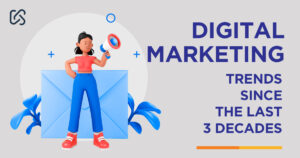
Digital marketing began to emerge in the late 1990s with the advent of the internet and the widespread use of personal computers and mobile devices. Early digital marketing efforts included email marketing, search engine optimization (SEO), and pay-per-click (PPC) advertising. As technology advanced and social media platforms emerged, digital marketing continued to evolve and expand to include tactics such as content marketing, influencer marketing, and programmatic advertising.
Digital marketing has had a significant impact on human life in several ways. Some of the most notable include:
- Convenience: Digital marketing has made it easier for people to access products and services from the comfort of their own homes. Online shopping, for example, has eliminated the need for people to physically visit stores.
- Personalization: Digital marketing has enabled companies to tailor their messages and advertisements to specific target audiences, making them more relevant and effective.
- Increased competition: Digital marketing has enabled small businesses to compete with larger ones by leveling the playing field. Small businesses can now reach a global audience at a fraction of the cost of traditional marketing methods.
- Increased access to information: Digital marketing has made it easier for people to access information about products and services. This has led to more informed purchasing decisions and increased consumer confidence.
- Changes in communication: Digital marketing has changed the way people communicate with each other and with businesses. Social media platforms have made it easy for people to share information and connect with others.
- Impact on Business: Digital marketing has changed the way businesses operate. It has made it easier for companies to reach customers, track results and make data-driven decisions.
Overall, digital marketing has greatly influenced human life by making it more convenient, personalized, and accessible to information, and has changed the way we communicate and do business.
Digital marketing has undergone significant changes since the year 2000. Some of the major trends include:
- The rise of search engine optimization (SEO) and pay-per-click (PPC) advertising, which have become essential tactics for reaching consumers through search engines like Google.
- The proliferation of social media platforms, such as Facebook, Twitter, and Instagram, which have created new opportunities for brands to connect with consumers and build relationships with them.
- The growth of mobile technology, which has led to an increase in mobile-responsive design and the development of mobile apps for businesses.
- The use of data and analytics to track consumer behavior and measure the effectiveness of marketing campaigns.
- The integration of artificial intelligence and machine learning into digital marketing, which has led to the development of personalized marketing campaigns and the ability to target specific audiences more effectively.
- The rise of influencer marketing, which involves partnering with individuals who have a large following on social media to promote products or services.
- The emergence of video marketing and the popularity of live streaming, which has allowed brands to connect with consumers in real-time and create more engaging content.
10 Techniques for measuring Digital Marketing Success; Read here

